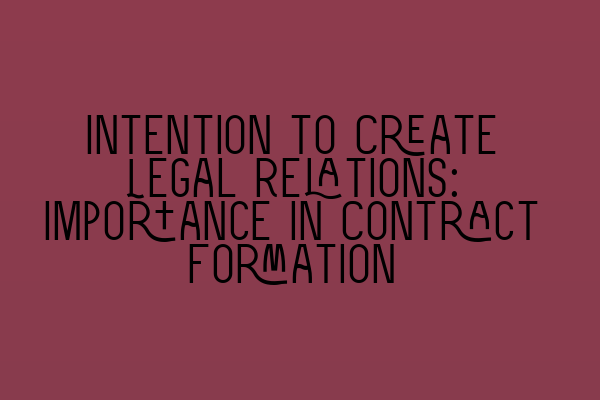Title: Intention to Create Legal Relations: Importance in Contract Formation
Introduction:
In the realm of contract law, the concept of intention to create legal relations plays a pivotal role in determining the enforceability of agreements. Whether you are a business owner, a professional individual, or simply a curious student seeking to deepen your knowledge of contract law, understanding the importance of this principle is crucial. In this article, we will explore the significance of the intention to create legal relations in contract formation, its applicability in various scenarios, and the implications it holds for parties involved.
1. Defining Intention to Create Legal Relations:
Intention to create legal relations refers to the mutual understanding and agreement between the parties involved in a contract that they are bound by legal obligations. It acts as a prerequisite for the formation of a legally enforceable contract. The parties must demonstrate an intention to be legally bound by the terms of their agreement, turning an informal arrangement into a legally recognized and enforceable contract.
2. Applicability in Different Types of Contracts:
2.1 Commercial Contracts:
Commercial contracts, such as those entered into by businesses or organizations, typically exhibit a strong presumption of an intention to create legal relations. The underlying assumption is that parties in commercial transactions intend to be legally bound by their agreements. Nonetheless, it is essential to clearly establish this intention in the contract for robust enforceability.
2.2 Domestic or Social Agreements:
Domestic or social agreements, on the other hand, are often considered to lack an intention to create legal relations by default. In these cases, the courts generally assume that parties did not intend their informal agreements to be legally binding, unless there is evidence to the contrary. However, if there is a clear intention expressed or circumstances suggest otherwise, such agreements can also be deemed legally enforceable.
3. Factors Determining Intention:
3.1 Express Statements:
Parties may include express terms in their contracts, explicitly outlining their intention to create legal relations. Expressions such as “intended to be legally binding” or “subject to the law” make the parties’ intentions clear. This clarity strengthens the enforceability of the contract.
3.2 Consideration:
Consideration is a key element in contract law and refers to something of value exchanged between the parties. The presence of consideration indicates that the parties have agreed to give up something in return for the benefits prescribed in the contract. The presence of consideration often suggests an intention to create legal relations.
3.3 Formality and Expertise:
The level of formality and expertise involved in drafting the contract can also impact the assessment of intention. More extensive and professionally drafted agreements are more likely to indicate an intention to be legally bound, while informal or poorly drafted agreements may not invoke the same level of enforceability.
Conclusion:
The intention to create legal relations forms the foundation of contract law and is of utmost importance in determining the enforceability of agreements. Whether you are engaged in commercial contracts or domestic/social agreements, ensuring that your intentions are clearly articulated is crucial. By understanding the factors that determine intention, considering appropriate terminology, and seeking legal expertise when needed, you can create contracts that stand up to scrutiny and provide a solid foundation for your business and personal relationships.
For more insights on contract law, be sure to check out these related articles:
– Interpreting Contractual Clauses: Unlocking the Hidden Meanings
– Contract Law Tutorials: Simplifying Complex Concepts for Students
– Discharge of Contracts: Modes and Consequences Explained
– Exploring Third Party Rights in Contract Law: Implications and Boundaries
– Contractual Obligations: Navigating the Responsibilities of Parties
